Saturday, July 16, 2005
This Blog is going on Holiday
Here are some pictures of the campsites we have booked:
Goldstream,
Sproat Lake
Miracle Beach
So for a few weeks this blog will blogs will sleep.
In the meantime I will give you my recommendation for holiday reading. Inspite of its title it is not about running. It is a novel about someone who finds himself on a quest, almost by accident. Without a plan he cycles across America to identify the body of a sister initially lost through madness. He meets people who help him and others who he helps; through this he remembers the person he was before his life atrophied. Intertwined in this is the story of his sister, the love he had for her and the effect she had on the family. It is not a gloomy book - there is a lightness and humour.
I can justify the recommendation on a running blog because one of the themes is the way daily physical activity, a little at a time, can add-up to become a great endeavour, which can then reconnect you with yourself.
Tuesday, July 12, 2005
Life goes on - it always does
This is a running blog and one of the constraint I set myself is to try to try to stay on subject, even if the link might be a bit tenuous So far it has not been a problem, and I have found things I wanted to say but between Thursday and Sunday this was not the case.
I was not personally affected by the bombings in the sense that I was nowhere near them when they went off and I know nobody who was directly involved. I am not someone who reacts to external events with great emotion and my life is much as it ever was. But, and this is rather a large but, my mental landscape was empty – like a ghost town in an old western, where the only movement is a tumbleweed blowing down the street. I had a constant sense of eerie quietness.
Thursday itself was very strange. I only knew something was wrong when colleagues phoned-in saying that they were having difficulty getting into work because the whole underground network was closed down because of power surges or a security alert. The rest of the day was spent trying to get work done with fewer people whilst constantly checking on the Internet to see more news. There was a horrible obsessiveness about reading the same things again and again to see if there was any more information. I finished about 7pm and ran to Euston (4 miles)to catch my train home. It was a most unpleasant run, where everything felt wrong. I felt wrong and the city was all wrong - theatres, bars and restaurants were closed and even Covent Garden was subdued. But I did not feel the emptiness until I got to the Euston Road. It was closed to all traffic - so still, so quiet.
It was then that I remembered the Potters Bar rail crash. On that day I had been at a meeting in an office block in the concourse of Potters Bar station. Our party was breaking for lunch, just walking down the stairs, when we heard the crump of the crash. We ran to the station and were amongst the first people there - trying in some way to help and not really knowing what to do.
When I think of what happened I don’t really remember what I saw: the broken bodies on the track, looking like puppets whose strings had been cut, or the way the carriage was wedged under the platform roof at a crazy angle. Instead I feel the stillness. Everything was quiet, disconnected and empty – and that is what I still feel inside myself. On thursday it all came back.
After that I did not want to write about running but I did want to run. So on Sunday I went back to my canal and my base run. It was leafy, beautiful and peaceful and, although it was a bit too hot and I suffered more than usual, at the end I was uplifted. My spirits were restored.
Now once again I want to write about running. The whole point of this blog is to try to record those moments when the simple act of putting one foot in front of another for a longish period of time can transform the way you feel. Make you once again feel connected. It is what I am trying to express.
Sunday, July 03, 2005
A good animal
“Emerson says of the gentleman that the first requisite is to be a good animal, and this is the first requisite for every one. A course of life which sacrifices the animal, though it may be defensible under special conditions is not defensible as a general policy. Within the sphere of our positive knowledge we nowhere see mind without life; we nowhere see life without a body; we nowhere see a full life–a life which is high alike in respect of intensity, breadth, and length–without a healthy body. Every breach of the laws of bodily health produces a physical damage, which eventually damages in some way though often in an invisible way the mental health.” (Herbert Spencer - ‘The Principals of Ethics, Vol. 1 Part III: The Ethics of Individual Life’, Ch. 5)
If it is important, and I believe it is, to look after our physical health, then it is important to know our animal nature. In the running manuals this is often glibly referred to as ‘listening to your body’ – it sounds fairly straightforward but it is not.
When we spend days sitting indoors, travelling, shopping, meeting, eating, drinking – just doing the normal things; it is very easy to become disconnected. We cannot interpret the messages. Is it an ache or a random twinge? Is that pain a message of damage or just a transitional stage, as things get stronger? Even the straightforward things are not clear. If you stand upright and close your eyes do you know that you are straight and balanced, or do you unconsciously favour one side or another, are you leaning forward or back?
Listening to your body can be a bit like being tone deaf at a concert – you know in principle what is happening but you can’t quite work out the detail.
For me part of the activity of running is learning to strip away all the rust and corrosion that has gathered around my senses and so feel myself in space. Part of that involves taking responsibility for what I do to my body and what it needs. Another part is learning to trust my basic animal nature and the wonderful machine I have inherited – finding out how strong and resilient it is, by learning and experimentation.
I do not think my body is especially wonderful (you just have to look at me to see it is not). I think all of us have great capabilities because that is how we evolved – after all our ancestors could out-run the antelope. It is that history I am trying to glimpse.
Now read how someone else has pursued that goal far more effectively than I could ever hope.
Thursday, June 23, 2005
It's the everyday things
Now I actually believe things will be all right because I have had one of those blinding eureka moments when another example of my stupidity became clear. The problems are the result of my posture at work, where a large part of the day is spent in front of a computer. Without being aware I have tended to sit for long periods with my legs bent backwards under the seat, on the toes of my left foot with my right ankle resting on my left Achilles. This has stressed my tendons with a passive weight and kept the plantar fascii under tension – not very clever. When this suddenly became clear I stopped. Magically my foot has started to feel easier. I am now making a conscious effort to sit straighter, be more balanced, and keep both feet on the ground in front of me. This must be good.
It only goes to show that not everything on your run is caused by running. What we do throughout the day: how we hold ourselves, how we move, how much we move, all contribute to how we run. If we repeatedly put our body out of balance we will create a weakness that running will magnify because the pounding of running makes it an attritional activity like water on the landscape.
The problem is that most of what we do during the day is habitual and unconscious and it is difficult to be continually aware and know whether we are doing the right thing.
I think I will just have to try harder.
Friday, June 17, 2005
Not a training run
I have two areas for my long runs: the canal, which I have talked about at length and Ashridge. Today was Ashridge.
“Running across the borders of Hertfordshire and Buckinghamshire and along the ridge of the Chiltern Hills, this area comprises a series of common-pasture woodlands, chalk downland and commons. Once a medieval deerpark, this estate covers some 5,000 acres. Walkers will enjoy the 16-mile boundary walk or the six shorter self-guided trails. Points of interest include the Monument, built in 1832 in honour of the third Duke of Bridgwater, the pioneer of Britain’s canals, and there’s a visitor centre near here too. A good time to visit the estate is late spring for a dazzling display of bluebells, and you can take in some super views too, if you climb Steps Hill to Ivinghoe Beacon. Look on the estate for a good number of surviving ancient oak and beech trees. Frithsden Beeches is not surprisingly a good area for the latter, whilst Berkhamsted Common and Aldbury Common are good locations for the oaks.” (Woodland Trust)
There are still plenty of deer and this morning two herds crossed my trail. The first time they were just milling about, the path was dappled with sunlight and there was a sense of quietness and peace. I looked at them for a while and then continued; they then ran off but I was smiling.
These moments lift the spirits and it is one of the reasons why I will not describe today as a training run. Training implies that what you are doing is preparation for something else whereas this is what I run for - it is the whole point. It does not mean that I will not put in training miles – there will always be those. It just means there are some days when you realise what the training is for.
Looks like this is another entry in my manifesto for the soft-core runner - except I don't want it to sound as if its written by some bucolic Polyanna.
Sunday, June 12, 2005
Running retreat
Adam Phillips, the psychoanalyst and writer, is not surprised by the growing popularity of retreats: 'People are aware of having too many external stimuli. What do you hear when you stop listening? The question is about whether anyone has an internal world any more.'
This is what running provides. Every week my long run is the equivalent of a retreat, because there is nothing but the movement of the body through space. This can happen automatically – you get into a rhythm and the body takes care of itself allowing the mind to be blank or drift onto various topics so that attention can drift. Alternatively there can be full attention and one is aware of how the muscles and breath are working together. In a similar way you have a sense of the space you are moving through, either through having to pay close attention to the ground because when you are off-road you have to be careful where your foot lands or by having a more generalised appreciation of the landscape, which tends to come in and go out of focus.
Through running you discover your animal core and without that I do not believe you can have a complete sense of being. Running is obviously not the only way to do this; yoga, for example, stretches the body to prepare the mind for meditation. I find running a better route because it is simpler, more direct and rhythmic. However I only really get a sense of oneness on long runs. In one of my earlier posts about injury I quoted Joe Henderson saying that when he was not running he really missed the short, nondescript, filler runs. With me that is not the case - I easily drop those. What I miss, and miss with great interior agitation, is the long run and the chance (as it does not happen every time) of getting to the state of sensing the body with an empty mind.
I think this forms part of my manifesto for the soft-core runner. The hard-core runner is deeply wedded to stats and targets, mileage and times (mostly long and short, in that order) but I am soft-core and my objective is the ineffable sense of being a good animal. Through that, eventually I might become a better person. (The might and eventually are heavily underlined in the last sentence).
Sunday, May 29, 2005
Sourcing quotes and the extraordinary
I particularly wanted to look at a quote from Jean-Paul Sartre:
"Only in games is man free because only in games does he understand what is going on"
I have no idea of its source and Google has failed me; so I will have to keep on looking. However the search is not without its rewards - not only have I decided to reread Roads to Freedom I have also found this quote from Nausea:
" I believe the word adventure could be defined: an event out of ordinary without being necessarily extraordinary."
This is a great definition of how I view running. When you look at the population as a whole, what we do is out of the ordinary but it is for the most part not extraordinary. There is however the possibility for the extraordinary, even the heroic. This report from Andy Collier about his completion of the Lanzarote iron man despite being ill with a stomach bug is a case in point. I don't know whether his endurance and bloody mindedness is exemplary or stupid, but it is certainly heroic.
The other thing that shines out from is account is the behaviour of Matt who offered both kindness and support out a sense of community. I think that is the great thing about triathlon or running. Mostly we are alone in our practice but we are also part of a community who share an understanding of what we are trying achieve and what we need. We are never really alone.
Wednesday, May 18, 2005
Now is the time
I have never believed in the idea of new year resolutions. Always I start the year by thinking of things I would like to see happen but tend not to do anything about it until about now. This is obviously the right approach because the day to start your new life is May 18
It is just so difficult to motivate yourself at the beginning of the year when the days are short and the weather is grey and cold. It is not a time to diet because your instincts tell you that you need comfort and warmth. It is not the time for training for the same reason. So for those who did a spring marathon - I salute you. I think it is much tougher than running in autumn when you can train on warmer days, in the light.
Me I'm planning for autumn.
Tuesday, May 17, 2005
What did I learn?
1. First and most obviously – running is experience. Thinking or talking about it is no substitute because you have to feel your immediate experience.
2. Suffering an injury makes you painfully aware of the consequences of your own actions. Whilst I had previously paid lip service to the idea of being careful and trying to run injury free, I did not fully feel it and did not really pay full attention. I had previously been able to experiment with different patterns of training without adverse consequences and so I thought my body was stronger than it actually was. I have been stripped of that illusion and know I have to always keep hold of that sense of frailty.
3. I have identified my area of weakness and that gives me something to work on - a way to improve.
4. There is nothing so damaging to your running fitness as not running – obvious but true - so taking unnecessary risks is stupid. Gradual progress is optimum progress, however I know I am prone to stupidity and need to constantly remember this.
5. Running is not the only exercise. By working on other parts of my body I actually feel stronger and these new routines need to be incorporated into my ongoing pattern. In particular I have been working on core muscles and shoulders. I have a theory that you need strength there to maintain form over the long distance.
6. All the exercises in the gym just feel like preparation - they are not an end in themselves, whereas running is fully sustaining.
However all that is mere mechanics the most important lesson is that running is incredibly important to my sense of being. It also makes me easier to live with. I found this out at a dinnertime conversation on the subject of shop names when I said my favourite was ‘Run and Become’. “Become what?” Asked my younger daughter. “Whatever you can be,” I said “It ‘s a path not a clear objective” “Yes” said my wife “you are far more content and relaxed when you are running”.
I don’t want to become a grumpy old man.
Monday, May 16, 2005
Water
I don’t want this to be a post about life, the universe and eternal verities – this is after all a running blog – but it is important to know that advice we receive is well founded. It is important to know that any science has been accurately reported and translated and the sources can be checked. If advice is based on experience then that experience must be directly described with all the circumstances to allow the reader to separate the more general lessons from the particular, individual instance. Then we can make judgements.
Sometimes, however, I worry that things are assumed to be true just because they are frequently repeated. Take hydration – apparently you should drink 2 litres of water (and only water) a day otherwise you risk chronic dehydration. This is an example of that sort of assertion from the BBC website. I know this is not a from a sports site and the article drifts off into something that should be savaged in ‘Bad Science’ in the Guardian ( I particularly enjoyed the electromagnetic memory of water and the idea of implosion research has a sort of charm), but I have seen similar water advice in a number of places.
In particular there is a lot of anti-caffeine prejudice. As someone who mostly drinks a mixture of coffee, tea and green tea I find this very tiresome. I have drunk like this most of my adult life and have not become progressively dehydrated and shrivelled like a prune (although my brow is rather too furrowed). My favourite recovery drink after a long run is a big mug of tea and I don't want to change that – so I will continue according to the motto that if experience contradicts the theory; stick with the experience.
However there is no contradiction. This article on the urban myths site Snopes seems to be the sort of balanced assessment I like - it means I do not have to change my ways. The worrying thing is that it cites a self-published book as the main source of the myth about chronic dehydration. How can such a publication have such a big influence?
One of the consequences of the Internet is that it allows rumour and speculation to be passed off as fact because of a weight of repetition. Alomost anything can spread like a virus. It is thus increasingly important to check sources and always ask: how do I know this is true?
Saturday, April 30, 2005
The middle path
Who are these that seem so crushed beneath their plight?
And he to me: These miserable ways
The forlorn spirits endure of those who spent
Life without infamy and without praise.
They are mingled with that caitiff regiment
Of the angels, who rebelled not, yet avowed
to God no Loyalty, on themselves intent.
Heaven chased them forth, lest their allegiance cloud
Its beauty, and the deep Hell refused them,
For, beside such, the sinner would be proud.
Now this is might be a bit of a dramatic response to something as trivial as not tying your shoelaces properly, but such small things are indicators of your level of care and attention.
I have two pairs of trainers: Asics DS trainers and Mizuno Wave Rider and have been running in them for ages being fairly happy but feeling that the fit was not quite right. I tied the laces of both to my standard level of tightness and never thought much about it. However after some experimentation I now find that both shoes are really good and the Asics in particular are fantastic. All that was needed was to loosen the laces of the Asics and really tighten the laces of the Mizuno’s around the forefoot. Magic and stupid at the same time.
The moral is clear – the middle way is not the right way.
More importantly, this applies to my training as well, where I tend to do my long slow runs too fast and my faster runs too slow (I think this might be a common error). It means you end up doing miles that have no clear benefit. I think eventually it grinds you down a bit and you lack snap in the legs.
I am now trying really hard to be disciplined and today felt comfortable running at a nice easy pace. The result is I feel relaxed and refreshed and ready to take on other forms of purgatory.
Monday, April 25, 2005
The mystery of running
...There is no all-pervading Proustian madeleine in Lelyveld's workaday prose. Yet salted through this short work is the smarting of an unpretentious lamentation: ''If this were a novel,'' ''If I were using these events in a novel,'' and so on. Flickeringly, the writer appears to see what is missing; and what is missing is the intuitive, the metaphoric, the uncertain, the introspective with its untethered vagaries: in brief, the not-nailed-down. Consequently Lelyveld's memory loop becomes a memory hole, through which everything that is not factually retrievable escapes.
It must be true that the best writing conveys a sense of the mystery of its subject. The question is: is there anybody writing about running who is able to convey its mystery - why it is so compulsive? why it gives you a sense of being? why it has a structure and a sense of purpose? Most of what I read is very functional - very nailed-down. This is fine because we need to know the science of what we should be doing, what has the best effect and how we should organise ourselves. However it gives no sense of why you should be running and the way it can make you feel connected. I need that as well.
There are some examples: Long distance information by Julie Welch is wonderful book. It intertwines a memoir with running. It is both about taking up exercise late in life and the way it enabled her to come to terms with the ghosts of her childhood and her career. It does not directly address running but running is the catalyst and by showing this she says more than any number of how-to guides.
The other writer I come back to is George Sheehan. On why he runs he says:.Through running I have learned what I can be and do. My body is now sensitive to the slightest change. It is particularly aware of any decline or decay. I can feel this lessening of the "me" that I have come to think of myself,,,Running has made this new me. Taken the raw material and honed it and delivered it back ready to do the work of a human being. I run so I do not lose the me I was yesterday and the me I might become tomorrow.
In this essay he recounts an encounter with a shingler. One of them is doing useful work, making something, the other is running but they are both 'doing good'. I love this because it leaves hanging in the air the idea that although your running does nothing to make the world a better place, it is still doing good.
Friday, April 22, 2005
My favourite run
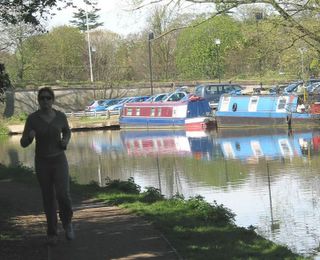
I had just joined the canal and taken out my camera when a lone runner appeared. I like the idea that the day started on theme.
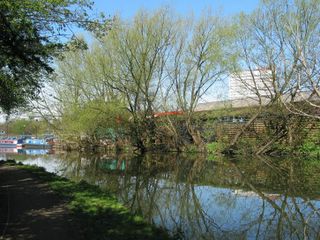
Canals have their own atmosphere that is different to the places they pass through. The mixture of ramshackle buildings, trees and boats softens the view of the Kodak Building - an undistinguished (ie ugly) office block - that dominates the entrance to Hemel.
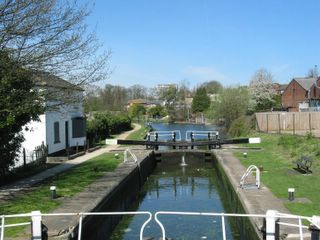
Of course there has to be a view from a lock. This is taken from a canal bridge, all of which are rather steep. I always walk down them to save my knees; I have no idea how the horses managed.
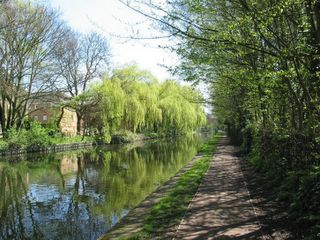
I always like the way that the willows reflect in the water - it reminds me of an imprssionist painting.
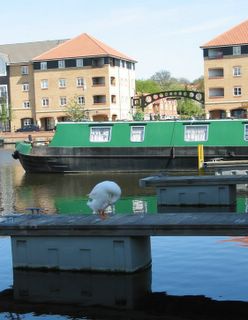
This piece of gentrification is on the site of the John Dickinson paper mill. In 1809 he invented a method of continuous paper manufacturer (as opposed to handmade sheets) and started production in what had previously been a flour mill here at Apsley. As the firm grew so did site and he also brought mills at nash Mills and Croxley. This site was closed down in 1999.
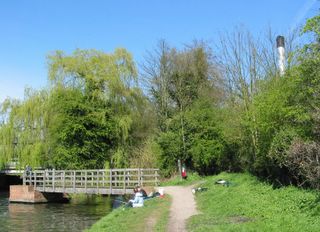
Canals are places of contemplation, whether it is fishing or just staring. In the background is the chimney of Nash Mills where paper is still produced - so not all links with the past are broken.
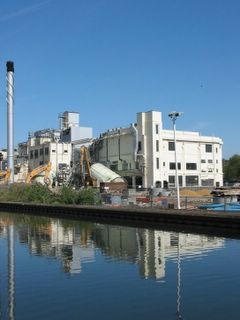
On the theme of significant industries that have moved away - this is the Ovaltine factory being demolished to make way for more houses. The first factory on this site opened in 1913, however it was replaced by this Art Deco building in 1929.
I always thought that Ovaltine was an English product (perhaps because I associate it with my childhood and milky drinks before bedtime). I only found out that it was Swiss when the factory closed and production moved back to Switzerland.
Ovaltine was originally developed as an energy drink and some of its advertising made outrageous claims. It was also the official energy drink of the 1948 Olympics. Hmmmm SIS or Ovaltine what will I choose for my long run?

Another link with the past is the great institution of allotments. All those years of people growing some of their own food.
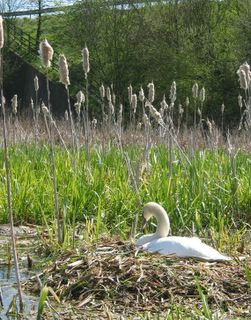
In the lee of the M25 spur road there is a pond off the canal where there are coots, swans and bulrushes.
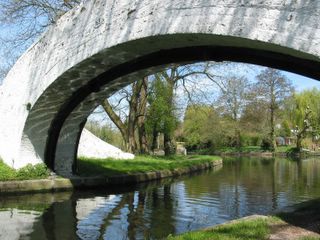
I will finish with this picture of a bridge for no other reason than I like the play of light reflected from the water. On bright, peaceful days I might just forget I am meant to be as serious runner and stop to stare at the gentle movement.
Tuesday, April 19, 2005
Back Again
The shin splints I had turned out to be a stress fracture - so it is just a matter of waiting until everything is 100% normal. But am getting a little paranoid, always testing how the leg feels - comparing it with the good leg and it is very difficult to be positive when you have lost confidence in the bodies ability to heal itself.
Nevertheless, slowly, slowly things have improved and I have a certain amount of faith that I will come back stronger. One of the reasons is that this break has forced me to look at my whole body and realise that running is not enough. There have to be other exercises to keep the body in balance.
I have been working on not only on strengthening all the muscle groups in the legs but also trying to increase flexibility (my hamstrings are pathetically short and tight). Core strength is not too bad but can always be improved, but shoulders are terribly tight - too much time in front of a computer.
I thus have a cunning plan to gradually introduce running into a more balanced exercise regime. I refuse to call it cross training it is far more sanguine than that.
Thursday, March 17, 2005
Blink
As a book it is not a highly structured work with a thesis derived from a clear chain of evidence; rather it organises research findings and personal stories around a central theme. Some of the stories are well known (like the attempt to change the taste of Coke), and the research is not necessarily recent. (Quite by chance, when searching for information on Hans Keller, the musicologist, I found a 1994 article by someone else with the same name, that described some of the research Gladwell used - the work that enabled researchers to accurately predict which couples would stay together, after observing a mere 15 minutes of their conversation). This allows some critics to dismiss the work as being less than the sum of its parts and something that tells us nothing new. However this misses the genius of Gladwell, who is able to find subjects we know subconsciously and illuminate them in such a way that we can both recognise them and see them in new ways. He is an “Of course I knew that; I just never thought about it before” sort of writer; someone who gets you to think about your own behaviour and the way you react with the world. In some strange tangential way that allows me to link it to running.
In Blink he describes three states. In the first the instinctive, quick response is precise and better than a laboured analysis. In the second instinctive perceptions are overlaid with too much data, which confuses rather than clarifies. The last state is where instincts are dangerous and wrong because they are just expressions of blind prejudice.
In running it is the equivalent of knowing how to listen to and trust your body. The first state is the ideal – the moments we train for – when we feel at one with everything and do not have to think because everything is in place and moving perfectly. The second is when we overlay the basic activity with too much analysis – should I be landing under my centre of gravity? Should there be more hill work? Should I have different shoes? What should I be eating? etc etc etc. The third is the lazy acceptance of false ideas of our own capabilities I’m not fast enough, not strong enough, too tired too weak.
So the question is how do you get to the state where you know you can trust yourself? The answer is actually obvious – training, testing and analysis. Blink is not a celebration of instinctive perception. It is a celebration of instinctive perception based on thorough training. The academic who could predict if couples would split could only do so after analysing hours of tape, the professor who learnt to read people’s minds by their tiny involuntary facial expressions could only do so after identifying each muscle movement and reproducing the movement himself. In every example the ability to know things quickly was based on a lot of work.
So with running the way to get to stage one is through stage two. One has to find clear and straightforward answers to the questions and find out what works for us by paying careful attention to our own and other people’s experiences. To do that you have to run, then run some more. Simple really.
Wednesday, March 09, 2005
Old habits
Now I said something similar in the previous post but at the time I didn’t realise how important an insight it was. No action is without consequence and that is especially true of the repetitive small activities you do not even notice. The way you sit in a chair, stand upright, drive a car, walk about, they all form how you hold yourself and that in turn determines how you run. Small changes can accumulate to have a big effect.
This was brought home to me very forcibly when I was watching a video analysis of my gait. It was not a pretty sight. My feet were splayed outward like a duck and my inner ankle was at an ugly angle. The strange thing was that when I had previously had a video analysis I ran much straighter – my gait was far more neutral. So over time the angle of my feet must have changed, unnoticed, very gradually until it became unstable.
When running you follow what feels natural, i.e. the body follows the line of least resistance and then reinforces it like a river in a valley. That line must have been formed by all of my daily movements: I stand with my feet in a v shape for balance, when I drive my heel balances on the floor and my feet splay out to control the pedals, when I cycle they also splay a little, when I lie on my back they fall open, when I sit at my desk my feet rest at an angle. I don’ think I am ever straight.
I must correct my habits – get my legs used to being straight and parallel. It will not be easy because many years of bad habits have to be corrected, but I will start by being aware, sensing the alignment. When we run we are constantly told to listen to our bodies but that advice tends to concentrate on effort and pain. I no longer think that is enough – we have to feel our posture and try to maintain proper balance. We need full body sensing of ourselves in space.
Saturday, February 26, 2005
Below base training via a detour
When we got off the train there was no guidance, no information point, no list of airlines - nothing but arrows to 2a, b,c,d,e etc. We picked one of those at random and found an information desk where we were told we needed terminal 3 and that there was a bus, which we caught. It stopped outside a building and we walked through the doors only to find a dark deserted concrete space, with no signs of life or even any signs to show us where we were. We were frustrated and baffled. Eventually we found someone to ask and were pointed in the direction of an unmarked walkway to the terminal.
The point of this anecdote is not to wallow in my own helplessness; it is to show the value of good signage. It is something as ancillary to the main activity, that might seem unimportant. When it is done well we don't even notice it. However when it absent or badly designed it messes up movement and makes things difficult, even unusable.
I began to think of the equivalents in running - the unconsidered activities that are not counted as training, not even noticed but actually have importance for your performance. For me they would include commuting. Home to station, station to work I am active in a way that is not be included in any training diary but over the years gives me a base. For others it could be any activity that involves regular walking, standing or lifting.
This base is at a deeper level than base training - it is the substrate below it. The more active you are the better you can build. But there are other areas that could be worked on. Posture is a good example. I am terrible - I sit slumped in front of a computer most of the day. I should be holding myself better so that my spine is properly aligned so that when I run everything is straight and square and the forces are evenly dispersed.
These are unconsidered things but they allow you to be in good shape for your training, allow things to move more freely – a bit like good signage.
Reason No. 13 for running: It is built on the whole of your life.
Tuesday, February 22, 2005
Some problems with cross training
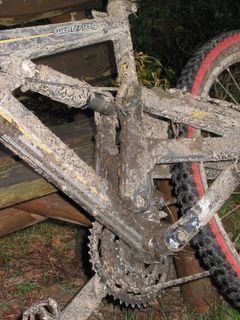
And I looked a bit like this picture of Fran Cotton:
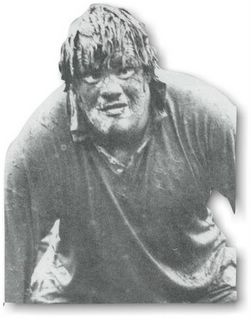
When I got home I received a pitying look, questions about my sanity and a request to not spread mud everywhere (the last was impossible). Things were so bad the post-ride beer had been skipped - something previously unknown.
That said the challenge to keep going was quite exhilarating (I only lost it twice, when there was just no traction between muddy tyre and slippy surface). It was also harder work than running - the wheels just got sucked into the clay. I think it must have increased the strength in my quads quite amazingly.
No cold bath nonsense after such a ride.
Thursday, February 17, 2005
Depression and running
I had a number of thoughts about the article at first I started to relate it to running.(Surely I am not showing signs of obsession). I thought about how hard it is to admit failure and readjust your programme. I have done that this year with my target for a spring marathon. I was so far behind schedule because of injury and I knew I could not catch-up but a lttle voice was always saying: go on you might make it, you never know, you have to try. I was torn and disappointed but when I made the decision to let go everything become simpler and more hopeful. I swear that my leg started to feel much better when I stopped worrying about it.
After that I started to think about running and depression and how it (or any similar physical activity) could help with this sort of low-key depression (i.e. a grinding, wearying despair).
I am sure that it works far more completely that just a chemical reaction caused by a surge of endorphins (though there is nothing wrong with that). It can help restore a sense of achievement and self worth, something that the correspondent had completely lost.
Everything else in your life might be in a state of chaos and collapse but when you run things are simple and ordered. You can always check your achievements, whether it is speed, distance or time and you know what you can do. You can prove that you are getting better. When everything else is failing you know you can run - and when you do run nothing else is important.
It might only be a little thing and it certainly is not enough - but it is something.
There might be a problem when your running has hit a plateau and you can no longer see improvement and don't think you are as fast enough. This in itself could cause despair. But it might not - it should not; because running is honest and it forces you to know your limits and there can be no pretence. You are forced to be realistic about your capabilities and plan within them. It is possible that this acceptance might be transferred to other aspects of your life and by doing so break down unrelenting greyness and start to deal with things a bit at a time. It is possible - but by no means inevitable.
Perhaps the most likely effect is the simple and direct one. It makes you stronger and that strength can be used to tackle the central problems.
Even if running does none of the above it still offers temporary relief by taking you away from things. That is still something.
It is interesting that Cary Tennis suggested that the person should take up writing – that is what he does. I started thinking about running - that is what I do. Perhaps we all have see other people's problems through our own lens.
Reason No. 12 for running: It might give you some strength
Monday, February 14, 2005
Cross channel training
However I am not sure that my activities for the past few days can be counted towards any form of cross training. I have been to Paris to visit my daughter and spent most of the time walking around the sights. It is true that I have been on my feet for long periods of the day, but it has only been at wandering pace – the urban shuffle that I actually find more tiring than running.
In all conscience I don’t think I can put anything other than a big round zero in my training diary. However the time has had other beneficial effects such as the feeling of well being that comes with eating good food and the lift in spirits that comes from looking at good art.
My daughter is doing something that I can only admire – taking a year out from work to learn French and understand the culture. She has fallen in love with the city and I think she is going to have some problems when she decides to resume her career. But that is in the future and who knows what will happen. At the moment she is having an adventure that all that matters.
She still runs. She chugs around a local park most mornings. The spur of the moment decision we made to run the Great North Run has changed our behaviour and we continue to be a family that runs together, separately.